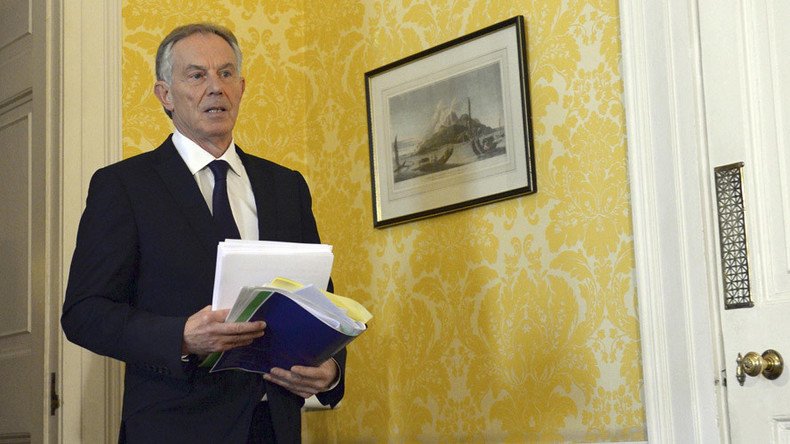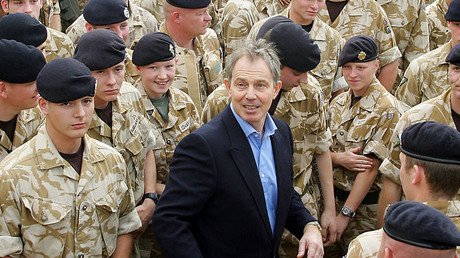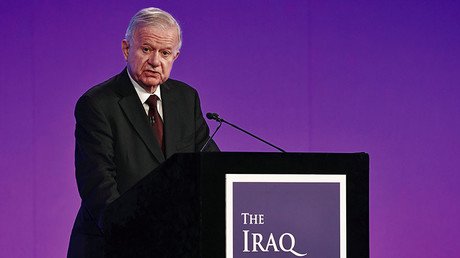‘US and British military interventions have been catastrophic for West’s true interests’

Many people have suspected there was a plan to topple countries, such as Iraq, that are also enemies of Israel, the US, and UK, security analyst and former UK army officer Charles Shoebridge told RT.
The Chilcot Report on the UK's involvement in the Iraq war was finally released, after seven years of investigation. Former UK Prime Minister Tony Blair said he apologized for the mistakes made in planning and executing the intervention but he stood by the decision to go to war. He also dismissed accusations that his decision undermined the UN Security Council's authority.
RT: Blair says Russia and France would have vetoed Iraq intervention at the Security Council. So is that fair justification for his decision to invade Iraq?
Charles Shoebridge: No, if anything, it is saying publicly as indeed many of us were saying at the time that: “It has been ruled unlawful, but therefore I am going to go ahead anyway.” After all, other than self-defense, which is clear and was clear at the time - notwithstanding how it was marketed at the time – that there was no imminent danger from Saddam Hussein; notwithstanding how much of the intelligent community, much of our politicians, and indeed much of the UK and US media tried to spin it into some kind of imminent threat.
Therefore, there was no imminent treat, so self-defense couldn’t be invoked. It would have to be by a UN resolution in the Security Council to allow that action to take place. Of course Blair knew that. But in some ways possibly France, particularly at the time and Russia even may perhaps unwittingly played into Tony Blair and George Bush’s hands by announcing that so publicly beforehand that they would veto it if it went to a UN Security Council resolution.
The reason they were going to veto, remember, is because the UN’s own arms inspectors hadn’t completed their work. They wanted to give a chance to Hans Blix and others to find those weapons that the US and the UK were claiming existed. Hans Blix and the inspectors were saying at the time to the US and the UK intelligence services: “Give us that information, give us that intelligence. We will go and check this out!” That intelligence was never forthcoming. That in itself, along with all the other aspects that are contained in this report, many of which are still to emerge, because it is still going to have very close scrutiny. It is of course questionable as to the extent to which that intelligence was reliable, and whether people knew it was reliable at the time.
RT: Tony Blair also said he regretted that parliament had voted against intervention in Syria. What do you make of that?
CS: It is an interesting line in one of his memos from 2001 – as far back as that to Bush – saying that shortly after 9/11 seeing the opportunity to attack Saddam; saying in many ways it could be interpreted as: “Ok, we’re looking at toppling Saddam, we can move on to Syria and Iran at a later stage.” Many people have suspected over the years that there was a plan, of which Iraq was just a part, to topple countries that by coincidence, some might say, are also enemies of Israel, of the US, and the UK, notwithstanding their own geopolitical situations. But that aside, it is really clear that much of the intelligence we know from Chilcot, that it was badly assessed; it was ill-thought-out and ill-informed intelligence in the first place. It was rushed; it wasn’t correctly assessed and analyzed properly.
It will still leave many, including so many in the intelligence community, who will ask the question, which doesn’t seem to have been addressed, or at least the accusation has not been made by Chilcot, as far as I can see at this stage whether there was any deliberate falsification of that intelligence; whether MI6 particularly and… other actors within the US and UK intelligence establishment deliberately falsified or exaggerated intelligence to support the government of the day and Tony Blair in a decision already made to go to war.
It seems that in many ways the security services have been let off lightly, because they have been condemned not for dishonesty, deceit, or perhaps even for illegal activity – which many suggest has taken place – but for gross incompetence, which at the end of the day that intelligence – some would argue and argued at the time, was intended to justify going to war. Once that war decision was taken and war happened, of course it doesn’t matter if subsequently it was found that intelligence was faulty, or even didn’t exist, because some would argue that the whole purpose of it was to justify the war, not be the real reason behind it.
Time for people to demand US ‘war criminals’ face charges
When US and UK forces invaded Iraq, the country had not one weapon with which to resist, and had been totally disarmed and starved down by the sanctions, said Sara Flounders the head of the International Action Center.
RT: Would do you expect to be Washington’s reaction to the inquiry? Do you expect anyone to be held accountable for what happened?
Sara Flounders: Of course the US wants to bury this immediately and Pentagon officials refuse to study it. But the real question the people of the world should be asking is: “When do the war crimes trials start?” Clearly this war by every count, and once again confirmed in this report, was a criminal violation of international law by every measure and by every standard. Any discussion that doesn’t involve a war crimes trial against these criminals that destroyed Iraq and led to the deaths of tens of thousands of people, left a whole society in ruins, and has led to the terror that we face on a global scale today. Anyone who is isn’t asking that question and is going to push this off for further study or bury it – is not in any way serious, or really part of the cover-up. This report which was to take a year, took seven years, 12 volumes. It is ridiculous and yet it must be used as a basis to demand accountability of these criminals in Britain and certainly here in the US.
RT: How likely is it that the US will hold a similar investigation?
SF: The US won’t discuss their criminal conduct in anyway whatsoever and they have refused to account for this war. I don’t expect them to respond to this, or to their use of torture; their use of tens of thousands of people detained in the war on terror; their massive destruction of Iraq, of Afghanistan, of Libya – on all of these they are silent. Yet, I think this is a time for the people of the world to demand that they be charged as criminals.
RT: David Cameron has given his take on the report, saying lessons should be learned. Yet at the same time he said this. So have lessons been learned?
SF: The lessons they want to learn is that they didn’t do proper planning on what to do with the occupation. And that meant that there was enormous resistance by the people of Iraq in a heroic stand, yet completely unable stop the occupation, the destruction of Iraq and the conscious plan - which was a British and US plan on using sectarian violence to divide and as a way of overcoming the resistance they faced to the occupation.
RT: Given the findings of the report, which said Blair had presented the existence of weapon of mass destruction as a certainty which wasn't the case, and the fact the conflict left Iraq in ruins, how do you assess Blair's decision to invade the country?
SF: The report says it wasn’t right, it wasn’t necessary, it wasn’t justified, it was ill-prepared, and that Iraq presented absolutely no threat. Whether one more imperialist power piled on, which would be France to that invasion, or not, wouldn’t have made it anymore right, or wouldn’t have made Iraq anymore of a threat. Iraq had not one weapon with which to resist, and had been totally disarmed and starved down by the sanctions that had gone on for 12 years before the actual invasion and occupation. And this was well understood. There were UN inspectors across Iraq…
The statements, views and opinions expressed in this column are solely those of the author and do not necessarily represent those of RT.














